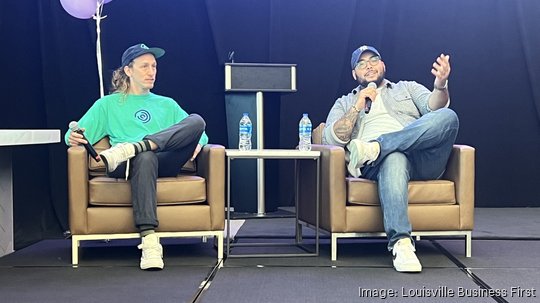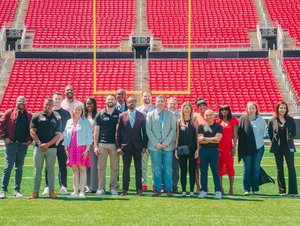
If I could attend more panels that center around the startup/tech world, I would.
Unfortunately, my schedule has limitations — especially this month, as my sports business beat has commandeered my calendar with the running of the 150th Kentucky Derby, followed by the 106th PGA Championship at Valhalla Golf Club last week.
At the beginning of the month, I attended a two-person fireside chat titled “Why You Suck at Fundraising” that was part of the inaugural Derby Tech Summit, held earlier this month at the University of Louisville's L&N Federal Credit Union Stadium.
The chat consisted of Steven Plappert and Derrick Maultsby, who both had lots of golden nuggets for early-stage founders.
Plappert is the co-founder and CEO of Forecastr, a Louisville based startup that produces online financial models for startups. To date, the company has raised approximately $9 million since its founding.
In 2023, the company was one of our Inno Fire award winners, as well as one of our KY Inno Startups to Watch.
Maultsby works as a senior associate at Louisville's largest law, firm Frost Brown Todd, one of the event’s main sponsors. Maultsby mainly represents venture-backed companies for preseed and seed venture funds. He is based out of Pittsburgh, but makes frequent visits to Louisville.
Although it is impossible to list all of their advice, here's my best shot at distilling it down to the most memorable statistics and quotes. Note: The discussion centered around three themes: narrative, human capital and preparation. The following has been edited for brevity and clarity:
Narrative: Why fundraising is like telling a story
- Plappert: “At the end of the day, [fundraising] really is a storytelling exercise. It is a communication game, it’s a game of … telling an effective story, a convincing story, which is how you’re going to go from where you are today, which is probably a relatively uninteresting place to the pot of gold at the end of the rainbow. Investors — while they do run their tabulations and all that kind of stuff — they invest on feel as well.”
- Maultsby: “I’ve heard a lot of investors say this: ‘We invest in founders. We don’t invest in the company as much as we invest in the founders, or folks that we believe in.’” Get yourself out of the pitch deck and focus on who I am as founder, and what is this company, and what is the story that we’re trying to tell.”
- Plappert: “You have to understand what an investor is filtering for [and] what they’re concerned about. Nine times out of 10 in my experience, it’s about revenue-generation. I’ve really tried to make sure that I can tell a convincing story to investors around how I’m going to acquire and monetize.”
Human capital: Don't skip the personal element
- Plappert: “I think a lot of people, they jump straight to this transactional-level game of ‘Let me tell you all the reasons why you should invest in my company,’ and like really focusing on the company and the merits of the company … And they complete the skip over the human element, the connection element. Investors, they’re not going to stick their neck out for your company if they don’t have any connection to you as an individual. I think the main currency of fundraising is trust and confidence.”
- Advice from Plappert via his best friend’s dad: “Be friends with everyone because you never know who’s gonna make it.”
- Maultsby: “Reputation is so important … and I think that you’re building relationships, and you’re trying to create a name for yourself or your company, especially in the Midwest, or smaller ecosystems … you’d be surprised how you're maybe one or two degrees of separation away from somebody.”
Preparation: Be ready for the big moment
- Maultsby: “One of the most disappointing things I see is when folks aren’t prepared for the moment. Some companie forget that they have to be prepared to take all this money and take all this capital — and they don’t necessarily understand what that process is going to look like.”
- Plappert: “Fundraising is a game of momentum. It’s a game of scarcity. When you hit on a raise, you need to raise quickly. You need to be showing progress quickly. An investor has no reason to be urgent unless they’re gonna miss out on a hot deal. It’s always better to be the last check in rather than the first check in.”
- Plappert: “I’m super intentional about launching a raise. I get the story battle-tested. I get all the investor context. I don’t have to get more intros while I'm raising. It’s just a matter of direct outreach to investors and get them on the books in terms of a meeting. And I do what’s called an investor blitz. You want all investors making decisions on the same timeline.”
Other takeaways from the Derby Tech Summit week talk
- Plappert’s definition of round sizes (in the software realm): Preseed: $250,000 to $1 million, with 18 months of runway (on average) with 12 months to reach a milestone and six months to raise a round. Seed round: $1.5 million to $4 million. Series A: $5 million to $15 million.
- Plappert on accepting dilutive funds: “Don’t worry about it early on. … Half a watermelon’s bigger than a full grape.”










